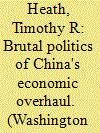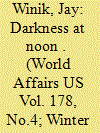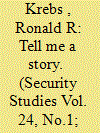| Srl | Item |
| 1 |
ID:
153986


|
|
|
|
|
| Summary/Abstract |
The economic and governance challenges facing China are well known. Economic growth has slowed from the dramatic double-digit increases of the past three decades to levels below seven percent. Debt levels reached 250 percent of national GDP in 2015, and could climb to 283 percent by 2020.
|
|
|
|
|
|
|
|
|
|
|
|
|
|
|
|
| 2 |
ID:
144424


|
|
|
|
|
| Summary/Abstract |
What did the era’s most prominent symbol of humanitarianism think when confronted with the world’s most compelling moral outrage? History records only a question mark.
|
|
|
|
|
|
|
|
|
|
|
|
|
|
|
|
| 3 |
ID:
138853


|
|
|
|
|
| Summary/Abstract |
Franklin Delano Roosevelt was, by all accounts, a master orator. Yet success eluded him as he sought to make his fellow citizens aware of the threat Nazi Germany posed and to banish isolationists to the illegitimate margins. At other times, however, Roosevelt’s campaigns to shift the underpinnings of national security debate were more effective. Notably, his definition of the adversary as the Nazi regime, rather than the German people, deeply shaped public discourse during the Second World War. This article explains the uneven results of Roosevelt’s narrative projects—and those of other presidents—as a product of the intersection of the rhetorical mode he adopted and the rhetorical demands of the environment. During unsettled times, public demand for storytelling is elevated, and presidents who seize that opportunity can shape the narrative landscape and thereby policy. Presidents who fail to align their rhetoric to the moment—such as Roosevelt offering predominantly argument during these critical junctures—allow alternative narratives to proliferate. More broadly, this article offers an account of the structuring of legitimation in the national security arena.
|
|
|
|
|
|
|
|
|
|
|
|
|
|
|
|